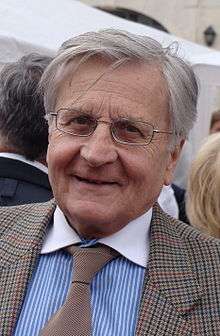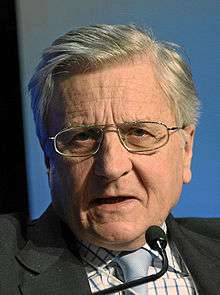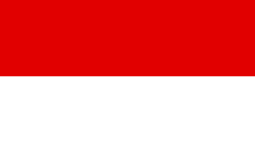Jean-Claude Trichet
Jean-Claude Trichet (French: [ʒɑ̃ klod tʁiʃɛ]; born 20 December 1942) is a French economist who served as President of the European Central Bank from 2003 to 2011. Previous to his assumption of the presidency he served as Governor of the Bank of France from 1993 to 2003 under presidents François Mitterrand and Jacques Chirac.
Jean-Claude Trichet | |
|---|---|
 | |
| President of the European Central Bank | |
| In office 1 November 2003 – 31 October 2011 | |
| Vice President | Lucas Papademos Vítor Constâncio |
| Preceded by | Wim Duisenberg |
| Succeeded by | Mario Draghi |
| Governor of the Bank of France | |
| In office 19 September 1993 – 1 November 2003 | |
| Preceded by | Jacques de Larosière |
| Succeeded by | Christian Noyer |
| Personal details | |
| Born | Jean-Claude Trichet 20 December 1942 Lyon, France |
| Spouse(s) | Aline Rybalka ( m. 1970) |
| Children | 2 |
| Education | École nationale supérieure des mines de Nancy University of Paris Sciences Po École nationale d'administration |
| Signature |  |
After stepping down from the European Central Bank, Trichet has taken speaking arrangements across France and served on the Board of Directors of the Bank for International Settlements. He was asked to join the non-doctrinal think tank, Bruegel, to consult on economic policy. In 2008, Trichet ranked fifth on Newsweek's list of the world's most powerful along with economic triumvirs Ben Bernanke (fourth) and Masaaki Shirakawa (sixth).[1]
Biography
Born in Lyon, Trichet was educated at the École des Mines de Nancy, from which he graduated in 1964. He later earned a master's degree in economics from the University of Paris and then trained at the Institut d'études politiques de Paris (best known as Sciences Po), finishing in 1966, and the École nationale d'administration (ENA) from 1969–1971, two French higher education institutions in the field of political science and state administration.
In 1987 Trichet became a member of Washington-based financial advisory body, the Group of Thirty. Later, in 1993 he was appointed governor of Banque de France. On 1 November 2003 he replaced Wim Duisenberg as president of the European Central Bank.
On 28 January 2012, the board of the European Aeronautic Defence and Space Company approved the nomination of JC Trichet to the Board (to be formally validated by the General Assembly of shareholders on 5/31/12), where he will represent (with Dominique d’Hinnin of the Lagardère Group) the Sogeade – the structure bearing the French shareholders' interests.[2][3]
In April 2012, Trichet was also appointed Bruegel's new chairman for a period of three years.[4] He will chair an 11-member Board, appointed by Bruegel's members, whose main task is to make decisions on the think-tank's strategy.
Trichet succeeded Mario Monti as chairman of the European branch of the Trilateral Commission in 2012.[5] He is a member of the Steering Committee of the Bilderberg Group.[6] He is also an advisor for the transatlantic think-tank European Horizons.[7]
Banking scandal
In January 2003, Trichet was put on trial with eight others charged with irregularities at Crédit Lyonnais, one of France's biggest banks. Trichet was in charge of the French treasury at that time. He was cleared in June 2003, which left the way clear for him to move to the ECB.[8]
2009 banking crisis
Within the European Central Bank, Trichet strongly resisted any contemplation of Greece defaulting on its debt. It was only in October 2011, with the end of his term imminent, that consensus was reached to allow a 50% cut in the value of Greek bonds.[9]

Former Minister for Finance Brian Lenihan had "a loaded gun pointed in his ear" when it came to the ECB letter sent to the Irish Government in 2010, a leading economist has said. Chief Economist of the world's largest bond trading firm Pimco, Paul McCulley said the late Minister for Finance had "very little choice" when it came to the ECB's letter to the Irish Government. The secret letter, sent on 19 November 2010, threatened to cut off all funding, unless Ireland immediately applied for a bailout.
The letter was sent by then ECB President Jean Claude Trichet to the former Minister for Finance Brian Lenihan.
The letter was sent on 19 November 2010, stating that the Governing Council of the Bank could only authorise further liquidity funding assistance (ELA) to Irish banks if it received a commitment in writing from the Irish Government it would send a request for financial support to the Euro group.
Speaking on Morning Ireland today, Pimco Economist Paul McCulley said that while most people had speculated what was in the letter, to actually see the contents was shocking: "To see it in black and white was nothing more than a firearm stuck in the ear [of the Government]. He said the former Minister for Finance had no options when it came to the ECB threats in the letter.
"You do whatever you do when you have a gun in your ear – you hand over your wallet. You are not suppose [sic] to feel good about it. But it is the logical and rational thing to do at that moment.
"After that moment passes, you had redress from the standpoint of 'I really don’t like the idea of having a firearm stuck in my ear". Six years later, we are now seeing a picture of the firearm emerging. I assume there is a fair amount of indignation in this country.
Speaking on Morning Ireland, Mr McCully said he couldn't guess if the ECB was bluffing.
"It is hard to know if they were bluffing because they no choice. Again my analogy of having a firearm in the ear is a fair one. The gun may have an empty gun but do you want to bet on it?”
He said that Ireland's debt should be "extended, modified and rolled so as to soften the blow of it".
It is understood there are three other letters in the correspondence between Jean Claude Trichet and Brian Lenihan in October 2010 and November 2010. The Governing Council of the European Central Bank is meeting today and the potential release of the letters is expected to be on the agenda.[10]
On 5 August 2011 he wrote, together with Mario Draghi, a letter to the Italian government to push for a series of economic measures that would soon be implemented in Italy.[11]
Criticism
Trichet has been criticised for the ECB's response to the Great Recession, which emphasised price stability over recovery and growth.[12][13] He was also criticized when he refused to answer a question about a possible conflict of interests concerning his successor's involvement at Goldman Sachs before taking charge as head of the ECB.[14]
Personal life
At age 22, he married Aline Rybalka, a diplomat and translator whose parents immigrated to France from Ukraine. They have two sons: Pierre-Alexis Trichet (born 1971), a marketing strategy director at telecommunications company Orange SA; and Jean-Nicolas Trichet (born 1974), a musician and producer.[15]
Honours and awards











References
- "Economic Triumvirate: 4. Ben Bernanke 5. Jean-Claude Trichet 6. Masaaki Shirakawa". Newsweek. 20 December 2008. Retrieved 20 March 2011.
- http://bourse.lefigaro.fr/indices-actions/actu-conseils/jean-claude-trichet-devient-administrateur-d-eads-58750 lefigaro.fr 1/26/2012
- https://www.nytimes.com/2012/01/27/business/global/trichet-likely-to-join-board-of-airbus-parent.html , 1/26/2012
- Voice, European (4 April 2012). "Trichet named head of think-tank". POLITICO.
- "About the Trilateral Commission - European Region". trilateral.org. Archived from the original on 9 May 2013. Retrieved 3 April 2013.
- "Steering Committee". bilderbergmeetings.org. Bilderberg Group. Archived from the original on 11 March 2014. Retrieved 8 February 2014.
- "European Horizons – A Transatlantic Think-Tank". www.europeanhorizons.org. Retrieved 12 February 2018.
- "Top Euro banker cleared of scandal cover-up". BBC News. 18 June 2003. Retrieved 15 August 2007.
- Landon Thomas Jr.; Stephen Castle (5 November 2011). "The Denials That Trapped Greece". The New York Times. Retrieved 5 November 2011.
- "'The ECB letter was a gun stuck in the ear of the Government' – leading economist". Independent.ie.
- Jean Pisani-Ferry (2014). The Euro Crisis and Its Aftermath. Oxford University Press. p. 183. ISBN 978-0-19-999333-8.
- "An Impeccable Disaster". New York Times. 11 September 2011. Retrieved 12 September 2011.
- Paul Krugman (1 December 2011). "The Summer of Confidence". The New York Times. The Conscience of a Liberal (blog). Retrieved 4 December 2011.
- "LIENS DRAGHI-GOLDMAN SACHS : TRICHET RESTE MUET (ARTE)". Arret Sur Images. Retrieved 9 September 2014.
- Bloomberg: "Trichet Proving Prophet-Making No Panacea in Recovery" By Simon Kennedy and Jana Randow 21 August 2009
- "ECB-president Trichet ontvangt koninklijke onderscheiding". Government of the Netherlands. 21 January 2011. Retrieved 4 May 2013.
- Postanowienie Prezydenta Rzeczypospolitej Polskiej dnia 31 sierpnia 2011 r. (M.P. Nr 108, poz. 1090) Archived 5 April 2012 at the Wayback Machine
External links
| Wikimedia Commons has media related to Jean-Claude Trichet. |
- Speech on 'The External and Internal Dimensions of Europe’s Competitiveness' at IIEA, 26 February 2009
- Appearances on C-SPAN
| Government offices | ||
|---|---|---|
| Preceded by Jacques de Larosière |
Governor of the Bank of France 1993–2003 |
Succeeded by Christian Noyer |
| Preceded by Wim Duisenberg |
President of the European Central Bank 2003–2011 |
Succeeded by Mario Draghi |
| Diplomatic posts | ||
| Preceded by Mario Monti |
European Group Chairman of the Trilateral Commission 2011–present |
Incumbent |